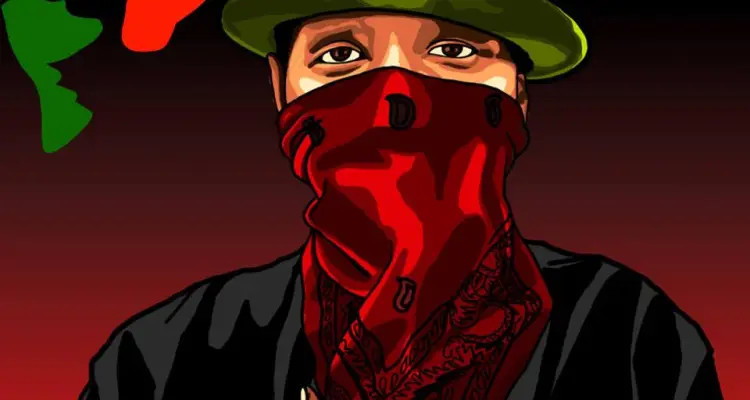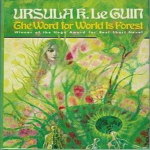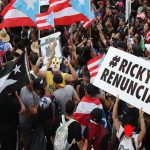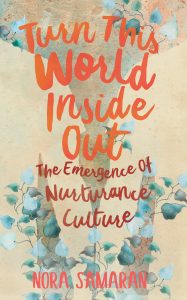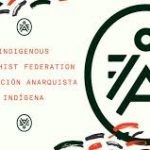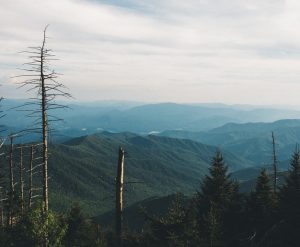Sima Lee on Resistance, Repression, Hip Hop, and Creating New Worlds
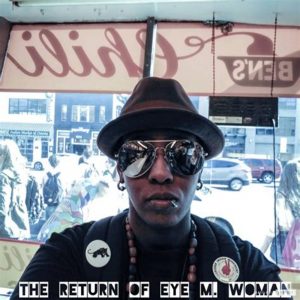
This week we are super pleased to present an interview done with Sima Lee, who is a queer Afro-Indigenous hip hop artist and community organizer of long standing, about a recent raid that occurred at Maroon House in DC this March. We speak about Maroon House, its story and what it is in the process of becoming, the ask for support in helping this movement build and heal from the brutal police repression, her newest album Trap Liberation Army, and many more topics.
Sima Lee has given some interviews recently about her political trajectory, her life, and relationship to anarchism in detail. Rather than having a repeat of those words, we are going to link her past interviews below!
Link to Bandcamp where there was an ask for monetary donation to help support the Maroon Movement and the Food, Clothing & Resistance Collective.
Ways to get and stay connected:
- @simaleerbg on IG
- @simaleerbg on Twitter
- Sima Lee on Facebook
- Food, Clothing & Resistance Collective
- Maroon Movement
Further interviews:
- November 2018 interview on The Solecast
- June 2018 spot on Academics in Cars with Jared Ball (IMixWhatILike)
- And You Don’t Stop: Trouble documentary on anarchist hip hop by SubMedia featuring Sima Lee among many others.
Independent artists and labels:
- Soul Trust Records
- The Beat Konductaz on the web and on Fedbook
- Guerilla Republik
. … . ..
Music for this episode:
. … . ..
Transcription
TFSR: Sima Lee, thank you so much for coming on to The Final Straw Radio Show. It’s a huge honor to get to talk to you. Would you just introduce yourself for listeners? Name, pronouns, anything you want listeners to keep in mind as they like hear your words?
Sima Lee: Thank you for having me on the show. I really appreciate it. I’ve definitely checked out some of the other podcasts in the past and really enjoy them. It feels good to be up here to be able to talk about what’s going on.
I’m Sima Lee the RBG. I am a hip hop artist, radical hip hop artist, organizer, revolutionary, I founded Maroon Movement, Maroon House and Food Clothing Resistance Collective, which has been operating since 2015. We are mutual aid, direct action, anti-fascist, anti-capitalist, anti-imperialist, anarchist, autonomous maroon squad, basically just trying to show how we can cooperatively, collectively, communally have dual power as we build up to take down this empire.
Whether that’s us helping to feed the community, helping to give out free clothing and other items, or making radical music, or creating a space for people to be able to come together to organize, to have culture, to talk about alternative medicine and alternative herbs and other things of that nature. That’s the work that I’ve been deeply embedded in. In addition to helping to do anti-gentrification work, just building up in these urban centers as we try to take down the prison industrial complex, the military industrial complex. It’s a full time job just trying to not be oppressed. To put it frank, that is what I do. I try full time to not be oppressed. I appreciate to be able to be on the program.
TFSR: Yeah, thank you so much. I really resonate with that as well. As the world is moving more and more and more towards… it’s always been chronically unstable for folks who are more marginalized by systems of power, but becoming more unstable as far as our climate goes, as far as our systems of infrastructure go. So I really appreciate projects like Maroon House, and the Maroon Collective for just taking power and taking care of themselves in the face of a lot of instability.
You’ve given a lot of really amazing interviews in the past, as far as your personal history and political development goes. You’ve talked about Maroon House a lot, but I’d love to hear a little bit about how that project got started and about the meaning behind the maroon part of Maroon House.
SL: Well, what came first in the process, to give a sped up version, I’m originally from Norfolk, Virginia. That is pretty much surrounded by the military industrial complex. The largest naval installation in the world is Norfolk, Virginia, and Hampton Roads area in general. So, from an early age, this is what I saw. I saw the military industrial complex, for what it’s worth. In addition to that, I saw everyone else suffering from low wages and oppression.
Virginia is where a large amount of liberated people who were once enslaved escaped into the swamps, and in particular the Great Dismal Swamp, and connected with other people who escaped harsh conditions. Sometimes they were deserters from war, sometimes it was other indigenous groups that were native to the land. They would build, what we would call today, dual power within those swamps, creating a community of resistance. So when other people would escape, they had an oasis, a place to go. They made their own rules and regulations and created their own law of the land, outside of the rule of the day, which still was legalized slavery.
So, much of how I developed my thought came from being from that area of Virginia, and the history from 1619 until, and the history of Nat Turner and Gabriel Prosser and other others who basically took it upon themselves to try and liberate themselves, and in conjunction with others and strong abolitionist movements that were built and upheld in Virginia. I took the concept of people working together and coming together. Of course, maroons are not just in Virginia. Maroons were everywhere Europeans dropped African bodies. There were maroons in Haiti, and maroons in Jamaica, and you have the Qilombo’s in Brazil and you have the Garifuna in Honduras. There’s just about everywhere that you go in Latin America and the Caribbean and other places that Africans created independent resistance and community.
When I came to Washington, DC, I attended quite a lot of other people’s events showing solidarity, just trying to learn the history and processes of what was going on locally. But I felt that there needed to be a place where people could come together from other organizations, from within the community, to be able to have a place to build and create and express themselves and have culture. Similar to many other spaces that have been like that in the past. It’s not a model that we invented. This is usually something that many people do in order to survive. Basically, a space where survival programs can be done, is what I felt that we should have.
So, after the Peace House split from the particular house that we were living in (which is another longtime mutual aid, direct action, anti-capitalist group) we continued, or I continued, in that same space in Washington, DC and named it the Maroon House. So Maroon House was intentionally Black, intentionally queer, and intentionally radical and all encompassing of what was going on at the time in Washington, DC. Which meant also cannabis advocacy and education. This will lead directly to why we got raided.
I don’t know if that’s the lead in questioning, but this is just giving a background of how we started and previewing to how the space ended, because we did have all these different radical elements within it, as well as entertainment, and as well as (as I said) cannabis education and advocacy after the passing of Initiative 71 that legalized cannabis in Washington DC.
Maroon House basically operated in the middle of a neighborhood and connected everyone. So that we could open up community gardens and have free stores and free schools. It was just a beautiful flourishing village. I wanted something that I didn’t see in other spaces. I think it’s very important for us as organizers to do that, because quite often we read books, and we see what others do. Outside of our imaginations, we blindly tried to imitate that, instead of creating new models that fit our reality. So I felt that it was important, whether it was successful or whether it failed, that it was important to hold down a space and operate it on our own terms, something that we felt reflected us.
The movement aspect of it, where we’re at transcends from a Maroon House to a movement is trying to get others to duplicate it and replicate that. To have their own houses and centers and co-ops and collectives and communes and farms, to be able to, again, have dual power and be free within this very, very oppressive system that is just pushing us all down. These are traditional, indigenous ways of resistance as well as anarchist. I can’t just say it’s all just anarchists models that I’m using. But it is a combination of a bit of both.
That’s how maroon House came about. It was very much needed. It was very successful. We got to a year before we were raided. It was actually not long after our one year anniversary that we were raided by the Metropolitan Police Department on the context of a neighbor’s complaint. Well, we knew that wasn’t true, because one of the things that we did not want to do was gentrify an already gentrified, Washington DC. So, we made sure that the core of what we were doing is building up the community. When I say building up the community, I mean the community within the community, meaning connecting everyone because there are always separate communities within community, but to have a hub where everyone could come together and we could talk to people about what’s going on within the neighborhood, within the larger Washington DC area… that’s what was important to me. There was no way we were going to set up there and just have events without having connections to our neighbors.
So, our neighbors would come to our free stores and the People’s Pantry. Our neighbors would come when we would have events. Our neighbors would even come when we would have classes or concerts or cannabis education events. It was a broad spectrum of people that would come through, because we made sure that everyone felt comfortable as long as you weren’t oppressive to others. We knew that the neighbors had not called because we actually knew our neighbors.
It was basically just intimidation. The actual sergeant who came in and this was a violent raid, mind you, they had AR-16’s and red beams on us. This was a violent raid. This was meant to terrorize the community and us. To set an example. But the police officers told us that they knew of our work, they were aware of our work, they respected our work, and then offered as they’re taking people out in cuffs (at the same time that they’re doing that) offered to donate to us for our free clothing giveaway. They actually did. The very next day, they dropped clothing off. As insult to injury, after they’ve terrorized our home and brought dogs and pointed guns at us. They offered us some of the clothing that they had and donated it.
What was important to me is that they told us that they knew the work that we were doing. Which means that they had been watching us. I don’t know how long they had been watching us, but they they definitely had. That is something that happened in March of this year. And as a consequence of it, we had to revamp the type of events that we had, because we knew that they were looking at events, anything of a cannabis nature, in particular.
TFSR: Yeah, that is a lot. I’m so sorry that y’all were forced to endure something so heinous. And to add insult to injury, the cops being like, ‘Yeah, we’ll donate to your thing.” I shouldn’t be surprised at the ridiculous, inhuman nature that cops move through the world in.
But I really connected to what you were saying about the flexibility of the organizing model that Maroon House had, where you said “that people read about stuff in books and they try to copy it verbatim or word for word.” I think that that kind of tends to perpetrate a lot of the problematic patterns that people have visa vie settler colonialism, or toxic whiteness, or what have you. They’re like, “Oh, we’ll just go back to the land and buy some land that we have no relationship to and that we have no idea who whose land it is actually.” So I really connected with that.
SL: It was very important that our space, even though it was ran by Black queer women and femmes, it was very important that it was brown and indigenous centered in addition to that, and it very much was. So the Black and Brown unity aspect was something that was always in effect, as well as bringing in white leftists. We felt that our job, to be quite frank, was to make sure white leftist left feeling a little less toxic, a little less settler-ish, a little less centered. Because you cannot be the center of an imperialist movement when your ancestors were the imperialist. When your current family members are the imperialist, there’s something has to give, when we are on stolen indigenous land and indigenous people are not at the forefront of what we’re doing. Or they are but you’re not listening to them.
So part of what we had to do within that Maroon House was to treat every white leftist who came into that space and white anti-racist as the potential next Marilyn Buck or John Brown. That’s how I looked at it. So when you leave, if you did not feel that way when you came in, I want you to feel that way when you when you go out. If you came here as an ally, I want you to leave as an accomplice.
The space was so important. It wasn’t just because of mutual aid, it was because of the living teaching. I am an early childhood educator, and I give lectures, and I teach adults as well but it’s the living model that people need to see. It’s the communication that they don’t always get. That was very much important about this space. So, I talk about that space a lot, because I want to see others, again, recreate spaces like this and for people to help do the work of building it up. It was extremely difficult to do that work, to open your doors and select strangers and is a lot. There are different models to do it. That was just the way that we chose to do it to open up our home, but there are different ways to do it. But because we lived there and we worked there and we taught there and we played there, when the police came they disrupted all of that.
So, right now there is is no Maroon House DC. It’s not because we were not able to sustain the events that we had that kept the space up. We had to revamp them, but we continued to have events, we continued to have people coming, because I refused to let them destroy what we’re doing. This is the anniversary, not long ago, of the killing of Fred Hampton and that was the raid that happened. We know how they raided the Los Angeles Panthers with the first use of SWAT. We know how they raided the Philadelphia Panthers. Infamous pictures were taking up them in their underwear to humiliate them. They do things of this nature to shake you and break you.
Because things had changed a bit within the demographics of the people who were in the collective, with some members having already left, new people being added who we really probably hadn’t vetted the best, and things that pretty much seemed like sabotage from within now not just coming from the state. So you have sabotage from within, from newer people, newer faces that we don’t really know as much. I made the tactical decision to retreat. So that I would not end up the next freedom fighter who has been murdered in their sleep by the police, or sabotaged from within by new members that we hadn’t vetted or hadn’t had a chance to vet as much. So now we’re in Baltimore, we’re no longer in Washington, DC, but the work continues. We do want to get another Maroon House. That is the goal.
TFSR: Absolutely. That’s amazing. That’s that’s really making me think of an interview that we did a couple of months ago with a rad space in LA called La Concha. They were having a lot of trouble being infiltrated by like authoritarian Maoist, state-communists, basically. They were talking about that as being something that they were really keeping eyes on infiltration from the State as well as infiltration from other ‘leftist groups.’ I feel like anti-authoritarian leftist resistance and energy is building on Turtle Island. And so resistance to that from bad actors is also building.
But I’d love to hear how people are holding up who were working in Maroon House? How are people doing and how can listeners help support y’all? How can listeners send you love if they are inclined to do so?
SL: Well, I’ll be honest, because I think about, again, in history we’ve learned from people who have gone through things and we look at it and try to relate to it. I think about how, so often a lot of the revolutionaries that we’ve studied, especially those from the ‘60s, ‘70s, and ‘80s, they would go through these horrible things of State repression or infiltration, or even sometimes… and I have to be careful when I say infiltration because I invited people to live within the perimeters of this space because they fit the model of what we were doing. But it’s not always some strange person walking in. It could be people that you know who end up doing a 180 of whatever they were doing when they originally met you, or said the right things to get into the door, and then change what they were doing afterwards. Or there is sabotage by way of not helping, not assisting. There is sabotage by the way of doing things to suck the morale out. There is sabotage by ways of leaving doors unlocked when you’re in the middle of military situations, or leaving windows open. Things that are odd. You find something might be in your food that originally wasn’t in your food or in your drink. There are different ways to sabotage that may or may not even be connected to the State.
For me, I don’t know if those things happen from the State 100%, or if it was just personal or other things. But all of these things are important when you’re thinking about having open memberships into into your space.
So for us, it has been rally our comrades get support to be able to get out of the space, which we totally absolutely did with a lot of people across the country supporting us so that we could get to another space in Baltimore. Originally our first space was in Baltimore and so we were returning back to Baltimore. Our first Maroon House was actually in West Baltimore. Right now what we’re doing is healing because, we feel that we got to just keep going and we don’t have time to heal from the everyday trauma. It is important to heal your body and your mind after you’ve been through something violent and we deserve that. I say we, meaning revolutionaries, we tend to think, “Oh shake it off, my ancestors had so much worse,” but we’ve got to take care of ourselves or we’re not going to be here, as the indigenous folks say (as myself, Afro indigenous) for the seventh generation. We’re not going to be here to leave a legacy for them if we burn out.
So what we’re doing now, first off trying to heal. We’ve just now talking about what we went through. This happened in March and it was so traumatic, we didn’t want to talk about it, because we had no idea if there was another raid coming. Was there more sabotage coming? We are also learning to trust again. I’m learning to be able to let my guard down a bit and still attend other events and speak with comrades and meet with them, even though one would be extremely paranoid after all the things that happened. I am extremely cautious right now.
But that’s what’s going on right now. We’re healing, revamping, rebuilding, and refocusing. We’re doing different things, basically, to be able to come up with a new space. However that that plays itself out, we’re trying to connect with more people on social media. We may set up a blog and start doing some art connected projects, some zines, just to be able to put out more information to tell our story. People can follow us on social media. Food Clothing Resistance Collective is on Facebook and it’s on Twitter and all the major social media sites. Maroon movement is also and myself, Sima Lee.
Some of our main core comrades are no longer within the vicinity of the space, but we still keep in good contact with each other. They’re treading on with what they’re doing as individuals. We’re looking right now for the first time to actually expand and recruit because we always kept it within the house, the members, because it was a little easier for me to feel that we could make sure that we knew everybody. That didn’t necessarily work, but at least for the first year it did. So right now we are actively looking for the first time to expand and recruit outside of the house. I’ll be working on that, probably for the next couple of months, what I want that to look like as far as the process, and what we want it to look like as far as the process of how we go about doing that and how we go about letting people know. But right now we’re just trying to add more people on social media and get people to reach out to us there and then we can connect in person.
TFSR: That’s awesome. And thank you so much for giving voice to something, this very complex and difficult to articulate phenomenon in leftist circles of sabotage by way of not helping out or sabotage by way of doing odd stuff. I feel like that’s not something that we have so much on our radars. So thank you for speaking on that, because I feel like it’s not spoken of enough.
SL: It should have been talked about really, really, really a lot after Occupy. We dropped the ball and went right into more pushing. We did not unpackage all of the things that we saw that was very weird, very sporadic, random types of acts that just didn’t make any rational sense towards the movement and we didn’t unpack that. I’m saying that as anarchists, we really should have talked about that and what it looks like to vet comrades and to find out more about each other. Still not wanting to invade on people and not to be authoritarian, but this is important. We’re doing radical work in major urban cities or in rural areas where definitely everybody knows everybody, and who are these people coming into this situation and we really need to be more careful. I know we get into this theory a lot, but the praxis is so important when you get into acting out what you’ve learned. You’ve got to be cautious with security. Our security culture is lacking across the board, not just anarchists. My revolutionary socialist comrades as well, our security culture really needs to be tightened up with everything that we know from COINTELPRO. We should know better by now.
TFSR: Absolutely. That resonates with me really hard. You mentioned COINTELPRO and learning about our own revolutionary history is the first step to understanding what kind of threats we face from the State and learning how to walk a line between not trying to be… Paranoia is a healthy thing sometimes, like there’s healthy paranoia, because sometimes there’s really bad actors out there. But there’s a sort of overblown paranoia that tends to be exclusive or exclusionary, or paranoia for paranoid sake, and learning to walk the line of being safe and getting yours and your comrades backs…
SL: There’s a thin line between healthy skepticism and then these rogue maoist units that are beating up comrades. That’s not what I’m talking about. What I’m talking about when I say that we need to have a better security culture, in fact, those things raise red flags of provocateurism. It’s just a part of study, and it’s just a part of growth. This is what you have to deal with, when you’re organizing. We’re in the heart of the empire, what makes us think we’re not going to be scrutinized and watched every step of the way? What makes us think that they’re not watching our social medias? I just gave mine out @SimaLeeRGB on Twitter and on IG. Sima Lee on Facebook.
I know that they’re already watching those things, so even when we put out public information, watch what we put out. How much do we want to give face to face? How much do we want to give electronically? These are all things that we should constantly be thinking about, because they’re constantly after us. Whether we know it or not, they are. They’re not gonna make an announcement. They didn’t announce that they were coming to our house. They just came and then they went away. Incidentally, all charges were dropped from that raid. I didn’t say that part. So, no one has been charged. There are no charges. No one’s in jail. It was just a complete disruption. Just a violent act just for the sake of doing it.
TFSR: I’m glad no charges, but obviously, there’s enduring trauma as there would be naturally if you have that kind of shit happen in your house.
So, you are a musician and you are a hip hop artist of some long standing. There was a call for people to download your most recent album Trap Liberation Army and there was a call for donations via that platform. I’d love to hear about that album, your process in creating it and some themes that it focuses on.
SL: Trap Liberation Army is an homage to Black Liberation Army, which was an underground fighting unit that splintered off, some from the Black Panther Party, but there are members who are also members of Republican New Africa and other Black liberation units, who felt that the above ground fight could desperately use arm resistant units in the underground. They worked in conjunction with brown liberation movements and white liberation movements. I mentioned Marilyn Buck, and David Gilbert, and so many others, Laura Whitehorn, so many others were a part of actions taken with the Black Liberation Army.
I thought of the proliferation of trap music, that’s the sound of the time. So, I thought I could combine the two concepts. “Why don’t we have a trap Liberation Army?” That’s more of a modern type of a twist on the same thing. Trap being the hood, the ghetto, and in particular, drugs. As far as peoples using drugs to make an income in an oppressive, imperialist setting. The colonized people might have to take measures to make money by any means necessary. With Trap Liberation Army, it’s about “how about we don’t do that? How about we look for alternatives, by any means necessary not just for income, but for liberation.”
It’s just a twist on it. There are good and bad things within the hood. I’m from the hood. I’m from the trap. I’m from the concept of not necessarily drug dealing, but it was surrounding me it was completely engulfed in the community that I was in, it was in the middle of the crack era. I always wanted to be liberated from that paradigm of suffering and pain. This is not to shame people who use drugs by any stretch of the imagination, but there was much suffering and pain and it led to the mass incarceration of my people. We’re still dealing with it right now.
So, Trap Liberation Army is a project that talks about the community, talks about the hood, talks about liberation and what it looks like, gives homage to those who fought in the past, because Black Liberation Army definitely used to fight against the surge of drugs that was coming into the Black community. My elders were a part of some of those units that taught me as a youth when I was in the community of the Umma movement which was connected to political prisoner Jamil Abdullah al-Amin.
So it’s just a way of me like mixing the old with the new, and pro-cannabis, pro-sarcasm, but very anti-imperial. Something you can nod your head to, because sometimes anti-imperial music is kind of boring. I mean, it is. It can be. To make it more interesting to give it a little bit of funk, to reflect the background that I come from. I call myself a trap or ghetto intellectual, because I don’t run away from my poor background. I think we tend to look at poverty as something that reflects us as opposed to something that is done to us. So I’m celebrating the beauty and the ugliness that comes within the trap, and the ability to liberate ourselves and look for a better future. I guess a lot of people call that Afrofuturism. But that is what the album is about.
Through Bandcamp, we’ve been able to get a lot of new followers and people who want to support the project. Also Bandcamp will recommend other music to you. So it’s a way that you can find out “If I like this particular song, can you recommend me something else?” So it’s a way, I hope that they found new artists after they listen to my music that are similar to the vein of what they’re doing. But I feel like we need freedom music right now, we need a revolutionary background to what we’re doing. While we’re tagging and feeding people and doing everything that we’re doing. So, I’m looking forward to introducing my music to some more new people, but also creating hopefully some new music and 2020 to put out there. So people like Franklin Lopez can stop asking me where my next album is out. [laughs]
But I’m really proud of the fact that he’s digging my music and also that it was featured in the documentary on Sub.Media in the documentary “And You Don’t Stop” for Trouble. I got to get introduced to some comrades that I’ve liked their music for a while and I didn’t really know them, but I got to talk to them and stuff after that, like Lee Reed and Sole. So that was pretty cool. Music is a cultural weapon and I’ve been involved in hip hop for a very, very long time. It’s always been my favorite expression. So just using it like Dead Prez, Public Enemy, X Clan, other groups that inspired me to help and boost the morale of the people.
TFSR: Absolutely. I loved that episode of Trouble that focused on hip hop. It was so awesome and La Marea and I’m forgetting who else was in there.
SL: Mic Crenshaw…
TFSR: Are you listening to anything right now that is giving you strength or other artists that you want to plug?
SL: I always say the same thing: I want to plug independent artistry and labels and collectives that I know of, that I’ve been a part of, because they are the ones that inspire me. Three different entities, collectives, independent labels that I’m connected to are Soul Trust Records out of Virginia Beach, Virginia, which is who I released Trap Liberation Army out from. These are comrades that I’ve known for a very long time. They’re my friends, really good friends, but we decided to have a space for independent artistry together. We put out some really good work so Soul Trust Records is just one big mass of incredible artists that people should check out.
Beat Conductors is a local collective in DC, Maryland, Virginia area that has a lot of Beat contests as far as like producer displays and battles. I mean, some really incredible instrumentals are played at these events. A lot of artists from across the country are gathering, it’s a competition but it’s more a building up of a family of musicians and artists, traveling together and explaining and working together, how we create in our creative processes, tutorials and classes. It’s been pretty cool working with them as well.
Then also Guerrilla Republik, which is a clothing label as well as a massive collective of artists that the brother Rob and Iz have been doing this for quite some time now. The people have really resonated. It’s been really heavily focused on Black and brown resistance and inspired by the Haitian Revolution. That body of revolutionary clothing and revolutionary art and music combining has been a beautiful thing. The artists that people might most associate with Guerrilla Republik would be Immortal Technique. But there are many, many, many talented artists that are affiliated with Guerrilla Republik, and I’ve had a pleasure to work with some of the comrades in Washington DC. I would tell people, if you’re looking for radical music to inspire you to definitely check out Soul Trust, Guerrilla Republik, and Beat Conductors.
TFSR: Thank you for that. One of the last questions that I had scripted out is about any words that you had on like your relationship to queerness and the relationship that queerness has to Maroon Collective, and to the Food Clothing and Resistance Collective? You as somebody who’s moved through and navigated and worked in a lot of political and social spaces, what things have come up for you visa vie queerness? And how have things changed over the years that you can locate? If that makes any sense?
SL: Change has been dramatic from losing spaces. The culture of queer visibility is a bit different now. Queer people are taking it upon themselves, I mean, as they always have, to be able to represent themselves, but it’s connecting in a different way. Where I see, on the one hand, there is more of a social acceptance via visibility, it doesn’t necessarily reflect all the time within movement circles and what leadership looks like. But people are loud and out there and they’re doing it. I’m very proud of the development of the queer folks that are out there and really getting it. Queer, trans non binary, gender non conforming, such as myself, we’re really taking it upon ourselves to attack the hetero patriarchy that has been the foal of so many movements.
Something that really pushes people away is a lack of feeling like they can be themselves in far too many leftist circles. There is homophobia, transphobia, and sexism. The importance of me being myself, and being comfortable… I decided a long time ago, either I was going to just be myself or I was going to play a role to fit in, and the choice I made very early on was to just be myself. So, I’ve never had to deal with a lot of resistance to me, as far as anyone saying anything to me in a hurtful manner.
I know I’ve been excluded from certain things, though, because of my my sexual orientation, and probably even more so my gender nonconformity as a masculine woman. But I really don’t give a damn because they couldn’t have been my comrades if you’re going to make such superficial choices, not to judge me by… I’m not going to say morality… principles, and ideological realness, because a lot of us say that we have ideological followings, but we don’t act through with them. So my integrity, wouldn’t allow a lot of people to come up to me and say certain things and oppress me. But I know that I’ve been left out of certain things because of my queerness.
We’ve had incidents within white queer spaces where we did not feel comfortable as Black and brown queer bodies. I see how my trans sisters are treated, and I see how my trans brothers are quite often just ignored and forgotten. Across the board, I see how people are taking it upon themselves to create their own Houses, their own scenes, their own films, their own music, and this body of resistance is coming out from queer people. That is a continuation of what we’ve been doing for over 40 years. It’s passing from one generation to the other to keep it going.
It’s not easy in Pan African circles, to be openly queer. It’s not easy. I’ve navigated through Pan African socialist circles, Islamic circles, revolutionary socialist circles, and again, quite often queer people, trans people are not centered in the circles. So, I’ve always felt that I would be that lance that was strike in the middle of that, and you’re gonna have to deal with me, and you’re gonna have to deal with my comrades, and you’re gonna deal with us, not as us feeling like we’re waiting for your acceptance, but you’re just gonna have to get with our program.
That’s how I’ve always felt about it. I’m not begging for acceptance, I’m taking my stake in this world that is all interconnected. In that aspect, my visibility is my weapon. I want you to see this masculine body, who’s not toxic, and who’s not following by the gender norms that you profess so well every day and the hetero patriarchy were my visibility, the visibility of my comrades and a collective that was ran by Black queer women and femmes was very important. It is very important. So I will continue to do this work even though I know that I’m probably not wanted in certain spaces. I’m not going to ask.
I’m not going to ask, “Can I be liberated? Can I be free? Can I be treated like anyone else?” I’m going to take it. So that’s always been how I viewed it. I have been a victim of hate crimes. I’ve been assaulted. I’ve been brutalized. I’ve had a lot of things happen to me as far as sexual and physical and mental violence. I am a survivor. I would tell any other queer youth that are out there and who are organizers to make sure that you build an intentional family to protect you, and to buffer you, and to laugh and to cry with because it’s very, very important. We’re trying to make worlds within worlds within worlds. It’s okay to create that. It looks like nothing that has been done before. It’s alright. It’s okay. It’s okay to create something new, and to be relentless with that.
We met a lot of queer people that came to the space and I didn’t realize until after we were packing up just how many different people that we touched with this work. So, I’m so eager to get another space so that queer people can feel that way in Baltimore as well with a particular spot. Not saying that there aren’t spots already, but to add to it. Because Baltimore is an incredible resistance town, and I just want to add to it with another space and reach out to the queer, Black and brown people here and trans Black and brown people here and gender non conforming non-binary comrades.
We’re on the verge of changing the reality. No more, would you see our faces on the front of newspapers as some things to be objectified and laughed at. You will respect us and that’s just what it is. So that’s how I take my day to day life as a queer activist. Not an activist, really just I’m queer and you’re going to deal with me and you’re going to respect me. This is how it is and we have a right to live and exist. It’s not very easy, always, especially if you’re visible. But is this is the work that must be done so that we can be free, because nothing’s given to you, you kind of have to take it.
TFSR: Yeah, thank you so much for that. I really resonate with that as somebody who’s subjectivity is a mixed race trans man who either gets as near as I can figure coded as either white or Arab depending on who is doing the coding and what kind of situation is going on. So, I very much resonate with the taking space, carving out safe space. And also, I have seen queer spaces become a bit less toxic, a bit less white, a bit more taking queerness as history as something that was very much like spurred on given energy by and created by Black and brown queer people, as you know, and is something that has been tried to be co-opted into like HRC, gay rich white kind of circles. But we have a long way to go still.
SL: A lot of the reason that that gets co-opted is because of the economic situation that queer and trans bodies are put into, because of the oppression that we face. So oftentimes, we feel like we’re unemployable. Or we’re easily fireable outside of the nonprofit industrial complex. So, here comes the nonprofit industrial complex. Some of our greatest queer and trans minds right now are working at jobs at nonprofits and they hate them. But they have to eat, and sex work is criminalized, and and you can’t do this and you can’t do that. So it’s so many things that that you can’t do, you can’t have events and have a space in the middle of Washington, DC and just be self sustainable, apparently. So people end up in non-profit industrial complex and their ideas are stolen. They’re not respected, and they’re still underpaid. Still whiteness is centered at the end of the day. It’s still white supremacy. It’s still a platform for the othering of people while they’re using these people. They will bring in, it’s almost as if they have a checklist, “Okay, I need one queer Black woman, I need to trans man…”
Trans people are speaking up for themselves and people are starting to really, really, really, really resonate with what’s going on. So let’s get a bunch of trans people in and you don’t respect those trans people that you’ve got to come in. You’re not paying them what they’re due. You’re taking their ideas and you’re literally using queer and trans bodies. It’s a big problem. But I don’t know how we get around around that other than creating grassroots orgs of our own, and not giving all our great ideas to these nonprofits? Maybe? I don’t know.
But that’s a serious thing. I feel sorry for my comrades, I see you out there. I know you’re drained. I know you don’t want to be in these spaces. It could even be just a different type of nonprofit that isn’t queer, but you feel drained and you feel used, and you feel marginalized, with people that saying they’re doing social justice work. I know, that hurts. I hope that you can liberate yourself from that, because it’s not a good feeling.
TFSR: Yeah, it is not a good feeling. I think creating projects like La Concha, like Maroon House, like Maroon Collective, is a really viable step in the direction of real queer liberation from white supremacy. Real liberation period from white supremacy, because white supremacy gave us all of this shit that we’re dealing with.
SL: …and capitalism, and so it all has to be toppled. So while I’m educating the hetero patriarchy, I’m educating white queer and trans folks, as well. Because you’re not separate from that. You might not be embraced fully as you might want to be. Sometimes I think people just want to be embraced more by the Empire, like when we were fighting to have trans or queer people be in the military, that’s not an advancement for queer and trans bodies, to be in the military. But I understand why some people do it, because this is the only way that they can get medical and other things.
We’re often put into these situations, because again, we’re not free and we’re not liberated. While we’re organizing and losing spaces, more spaces are popping up. So we’re just gonna have to keep pushing for our independence and autonomy and to to be heard and to lead even as we’re talking about horizontal leadership or temporarily. It’s still important to have Black, brown, indigenous queer trans two spirit bodies in these spaces. And I don’t see that from a lot of white leftist groups. So people are organizing their own and a lot of the new groups that I see popping up are led by queer and trans people. I just say, “What’s up? Keep doing it. Power to the people.”
TFSR: Well, if you if you ever come through Asheville, it’s been noted before, both on air and off air that pretty much literally all of the anarchists here are queer or trans. Like it’s notable when you find a cis-het person who’s an anarchist, we’re like, “Oh, it’s the unicorn!!”
SL: That interesting, but that’s what I’m saying. Create your own reality. We can flip the reality around and that is wonderful. Now I need to go to Asheville.
TFSR: Yeah, come through, come through. Yeah, we’ll show you a good time. We have all the vegan barbecue you could ever eat… or any kind of barbecue, whatever, people should eat what they want.
Sima Lee, those are all the questions that I had scripted out, but is there anything that’s on your mind that you want to give voice to or any words that you’d leave listeners with as a parting words?
SL: Feed the people. Go out and feed people, go out and give people clothing, sabotage capitalism, like sabotage it. You see it cracking, you see it breaking, you see it lashing out across Latin America and the Caribbean, and here, and Asia, and the Middle East people are lashing out because capitalism is no good and we see it. Whether it’s Chile, or Bolivia, Ecuador, Haiti, Paris, people are resisting. It’s time for Turtle Island, so called North Amerikkka to start sabotaging the wheels of the empire. Because other people need for us, within the belly of this beast to do that.
We need it for ourselves, first and foremost. I’m living in Baltimore, Maryland, which is segregated. It is very much segregated. It has a higher population of men in jail, Black men in jail in Maryland, more than in Mississippi. Again, I’m gonna say it again, it’s segregated. We’re living in segregated cities. We’re living in a place where food stamps are being cut from the masses. We’re living in a place where corporations we’ve known since children are closing. We’re living in a time where what it looks like to make money is changing. Hasten what work looks like, redefine what work is, redefine bartering, redefine what family looks like. We’re redefining everything, gender, everything. Redefine it, evaluate it. It’s good to learn from the past, but also learn from the mistakes.
I’m just anxious to see what 2020 looks like as we go into these ridiculous elections and all of this stuff that’s going on. Whether they impeach Trump or not, as long as we have imperialist capitalism ruling over us, it doesn’t matter what the figurehead is. So, I just want to see my comrades across the country, across the globe, to hasten the fall of imperialist capitalism, of racism, of sexism, of ableism, all of the things that have been impeding us and holding us back. Get your trans power, get your queer power, your Black, your brown, your indigenous power, and even Fred Hampton said, “you poor white people get your power too.” It cannot be on the back of your comrades and on the platform of white supremacy, we need you to be your European descended selves. Whiteness has to go, as far as a category of social political oppression.
So we would like to see the abolition of whiteness, and bring back the greenness of our land, and the blues of our water and our skies, and deal with this ecology that is just crying out for humans to just chill. This is where we are, we have so much work to do. I don’t know how to give any one thing other than to say, “Push it all.” If you think you’re pushing too much. I tell you, you’re not pushing enough. Push, push. Let’s see the end of this oppression and let’s create a new reality.
TFSR: I love that. I love that. Yeah. Thank you so much for your words and your energy and your heart and your mind. Like it’s been a beautiful experience for me getting to talk to you. And I hope that we get to like build and fight and work together in future.
SL: Absolutely. I plan on going as much as possible up and down the east coast, down south, and I’ve been invited a couple of times out west so maybe I might finally get to Cali and Seattle and Portland and other spots. I know the comrades are always doing their thing. I’m looking forward to meeting anybody and everybody who’s down to really push anti-capitalism as far as we can, in these colonized territories.

